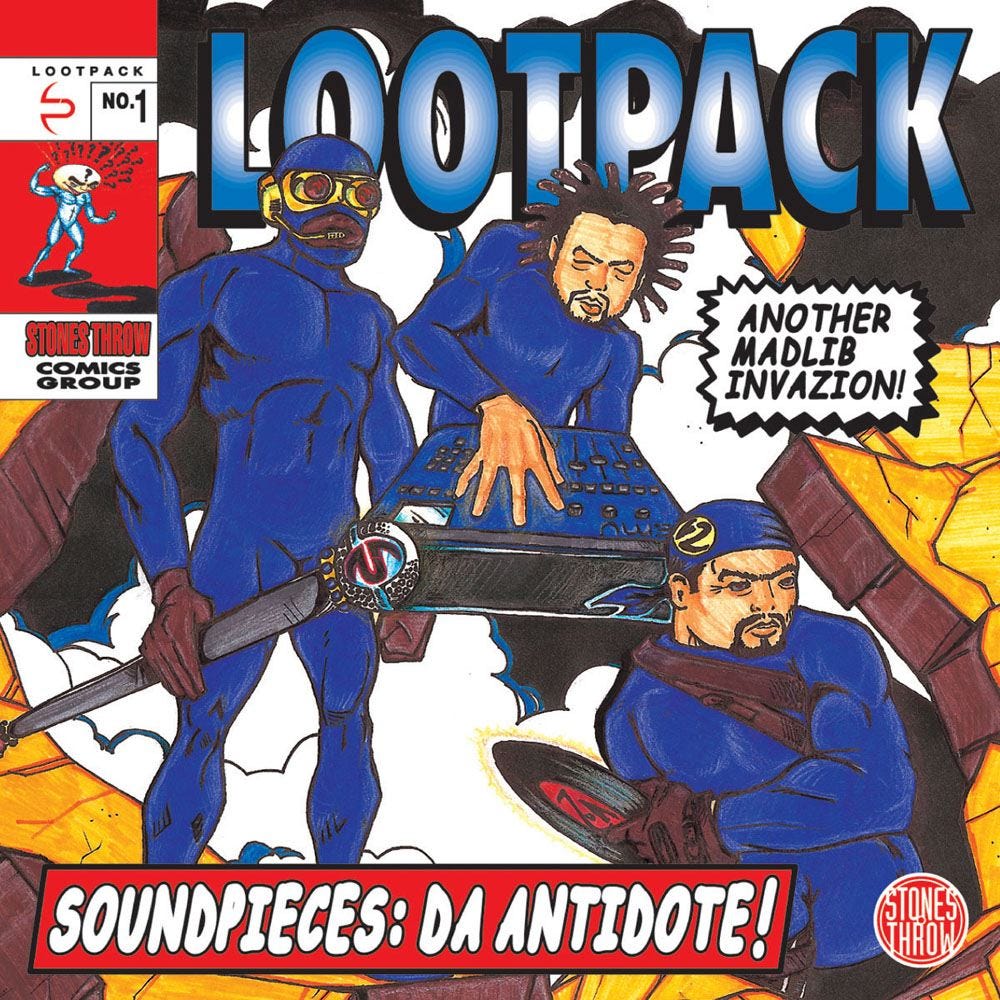Milestones: Soundpieces: Da Antidote by Lootpack
Lootpack’s debut marked the beginning of a series of Stones Throw album runs, and it signaled that the West Coast’s underground community was blossoming into a hotbed of imaginative energy.
Lootpack, consisting of emcee Jack “Wildchild” Brown, rapper-producer Otis “Madlib” Jackson, Jr., and DJ Romeo “Romes” Jimenez, began crafting their sound in the early 1990s. Madlib and Wildchild debuted on the track “Turn the Party Out” from Tha Alkaholiks’ album 21 & Over in 1993, with Madlib handling production duties for the song and the single “Mary Jane.” The trio continued their collaboration with the Likwit Crew, featuring on Tha Liks’ subsequent albums.
In 1996, they independently released the “Psyche Move” 12-inch via Crate Diggas Palace Records, a label owned by Madlib’s father. The record caught the ear of Christopher “Peanut Butter Wolf” Manak, who was establishing Stones Throw Records and was looking for talent to join his roster. Upon hearing “Psyche Move” on an LA college radio station, PB Wolf sought out Lootpack, making them the first act to sign with Stones Throw. Soundpieces followed a few years later.
Despite being Lootpack’s sole full-length album, Soundpieces: Da Antidote cemented their status as the foundation of Stones Throw. Many of the artists PB Wolf signed in the late ‘90s and early 2000s had ties to Lootpack, whether they emerged from the same scene, were related to Madlib, collaborated with him as a producer, or a combination thereof. PB Wolf’s connection with Lootpack directly influenced Stones Throw’s most essential albums.
The impact may not be immediately apparent, yet it played a crucial role in defining the evolution of left-field hip-hop on the West Coast. Marking its release a quarter-century ago, the album was seen as a strong offering from a self-proclaimed “underground” collective. Dedicated hip-hop enthusiasts, such as the narrator, found themselves constantly revisiting the album, whether driving through the streets of Chicago or lounging on the black sand beaches of Greece. The album’s influence on the genre’s trajectory in the following years is acknowledged and celebrated.
Lootpack was the embodiment of Wildchild and Madlib showcasing their prowess over Madlib’s gritty, dusty loops, with DJ Romes masterfully handling the turntables. The group’s lyrical content predominantly focused on calling out subpar emcees and asserting their lyrical dominance. While some critics found this approach monotonous, it reflected the growing divide in hip-hop towards the end of the ‘90s. As mainstream artists embraced commercial success, the underground scene, to which Lootpack belonged, felt compelled to voice a firm rejection of the genre’s materialistic trends.
Soundpieces begin with “Questions,” where Lootpack pays homage to the emcees and groups committed to preserving hip-hop’s authentic spirit while condemning those who adopt inauthentic personas and disregard the culture’s roots. “Weededed” stands out as an unusual hip-hop track, presenting a critique of marijuana use among emcees who claim to rely on it for creative inspiration. Wildchild’s stance is particularly noteworthy, given the widespread acceptance of cannabis in the hip-hop community.
Although Madlib’s rhyming abilities were not his strongest suit then, he still showed competently on the mic throughout Soundpieces. He even takes on some solo verses, with “Crate Diggin’” being a highlight. The track is Madlib’s tribute to the art of sampling, and it features one of his best beats on the album—a drum track that pulsates like a heartbeat, complemented by beeping keyboard sounds and stabbing strings. While Madlib’s lyrical performance on “Hityawitdat” might not be his most memorable, his talent as a producer shines through in his deft manipulation of keyboard sounds to craft an infectious rhythm.
Madlib’s culinary approach to music continues to delight on Soundpieces, as he serves up some of the most delectable compositions in his illustrious career. On “Speaker Smashing,” Madlib and Wildchild pass the microphone back and forth over a murky, slow-burning beat adorned with distorted guitar sounds and organ explosions, giving it an almost disorienting feel. “Laws of Physics” is a short piece based on a carefully reconstructed string sample from Mavis Staples. “Answers” is one of the album’s best songs, serving as an unofficial sequel to the aforementioned “Questions,” with Madlib and Wildchild each flowing in a slower groove over the flute loop of Lee Mason’s “Shady Blues.” The song is the first to feature the vocals of Quasimoto, Madlib’s drugged, bipedal antea
In addition to Future Lord Quas, Wildchild, and Madlib feature their friends and family on “Soundpieces,” allowing each rapper to showcase their style and lyrical skills. “Level Zero” features Oh No (one of Madlib’s younger brothers) and Medaphor (aka MED), now accomplished singers/producers in their own right. God’s Gift contributes two verses on “Verbal Experiments,” a sparse recording featuring punchy drums, sharp moans and trills, and shimmering notes and tones. Declaime (aka Dudley Perkins) debits his verse on “Break Dat Party,” a melodic track where Madlib first showcases his penchant for sampling soul/spoken word artist Melvin Van Peebles.
Lootpack also brings some of their contemporaries from the LA underground music scene to spice up Soundpieces. Dilated Peoples participate with the gritty “Long Awaited,” which is probably the strongest lyrical track on the album. “Likwit Fusion” is a reunion between Lootpack, their mentor Tha Liks, and Likwit Crew member Defari. It’s a chaotic, funky team track where everyone gets to go wild.
The album ends with “Episodes,” a nearly nine-minute marathon team track that features many of the Lootpack extended team members, all of whom have appeared earlier on the album. The song showcases the versatility of the Lootpack members’ lyrical styles while further proving Madlib’s expert ability in production.
Some may criticize Soundpieces: Da Antidote for the one-dimensionality of their subject matter, but their presentation and commitment to values make them stand out. Indeed, from a production perspective, it is one of the best musical showcases of the late 1990s. Wildchild and Madlib are more sincere and raw than ever on Soundpieces, and their careers are all the better.


